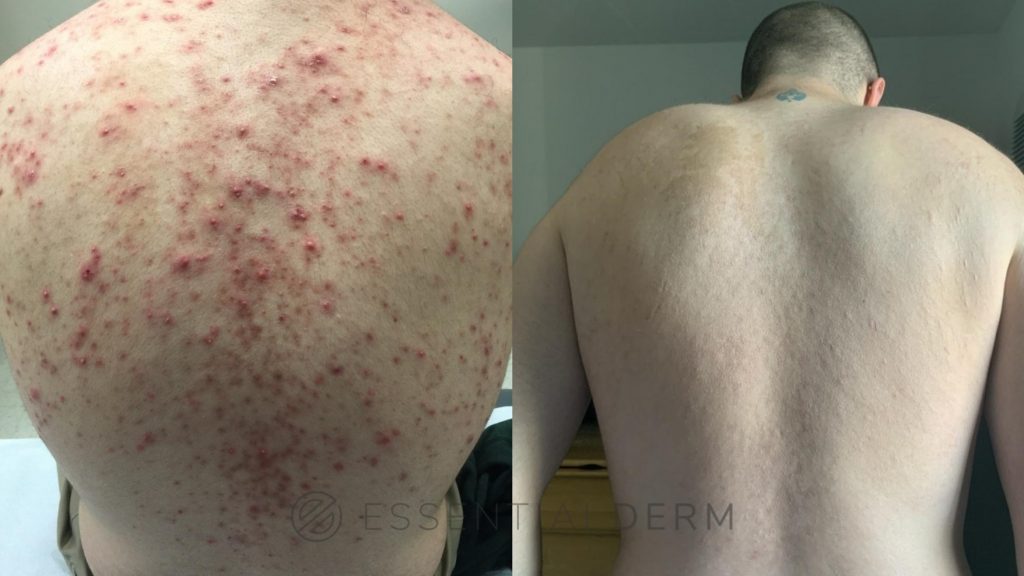
23
Mar
WHAT IS ISOTRETINOIN?

Isotretinoin Explained
Isotretinoin, widely known as the prior branded therapy Accutane®, is an FDA-approved oral therapy for the treatment of refractory severe cystic acne. Off-label use includes acne not responding to other treatments, rosacea, and other inflammatory disorders of the skin (including hidradenitis suppuritiva and dissecting cellulitis of the scalp).
Who is eligible to take isotretinoin?
Patients with cystic and/or nodular acne not responding to other treatments are ideal candidates. Most patients, after completing an isotretinoin course, will have full clearance of their acne for several months. After completing an isotretinoin course many patients develop acne again, but the severity is much more mild than before therapy and usually responsive to topicals alone (no pills). There is no age restriction for isotretinoin, however relapses are more common when the first round of treatment is completed before age 15.
What does an isotretinoin course entail?
Most patients take daily isotretinoin (for acne purposes) approximately 5-6 months. Treatment lengths vary by individual response to therapy. For example, some patients respond as soon as 5 months, and others require a prolonged 1-year long treatment.
Patients who are “of child bearing potential” are evaluated with monthly pregnancy tests, starting 30 days prior to the onset of treatment. All patients are required to have baseline blood testing (before treatment onset), and typically after months 1 and 2 of treatment. This ensures that the medication is not affecting the liver, triglyceride, or muscle enzyme testing. Rarely these can be affected by isotretinoin therapy. Patients must also see Dr. Krathen monthly in the office or through teledermatology (video visit) to ensure the treatment is performing and check in on side effects.
What are the side effects of isotretinoin?
While the potential negative side effects are real, in my opinion, the risks and cautionary tales seen on the internet regarding isotretinoin are a bit blown out of proportion. As the risk benefit balance is evaluated for each individual patient, only a frank discussion between the patient and their clinician can help determine if and when to start therapy with isotretinoin.
Most patients develop dry cracked lips along with dry skin (90% or more). A smaller subset of patients develop nosebleeds and joint pain / aches. Rarely patients experience changes in their blood testing, including triglycerides, liver testing, and muscle enzyme testing.
The most worrisome unintended result of treatment is the exposure of a pregnant patient to isotretinoin. As isotretinoin commonly leads to severe birth defects upon exposure during pregnancy, patients generally must use two forms of contraception during the treatment course (including 30 days before and 30 days after the medication administration period). Once a patient has completed isotretinoin for 30 days, there is no concern in the ability to become pregnant or for future birth defects.
A rare outcome, usually noted more often in male than female patients, is the development or worsening of a mood disorder. Anxiety and depression can develop and/or worsen on therapy. In my experience isotretinoin tends to uncover a previously existing but not yet diagnosed mental health condition. It is crucial that isotretinoin patients experiencing a negative impact on mood and/or anxiety stop the drug immediately, reach out to the treating dermatologist, and follow-up with either mental health care or their primary care doctor right away. In my experience, since acne independently and negatively impacts self-confidence and mood, most patients notice an improvement in mood and self-confidence throughout the course of treatment.
How can one manage the side effects of isotretinoin?
1) Apply lip emollients regularly. Vaseline / Aquaphor / Dr. Dan’s Cortibalm are great. Use a q-tip for application. Using a finger may introduce infection into the lip.
2) Wear sunscreen routinely
3) Use humidifier in the bedroom and home
4) Avoid alcoholic beverages
5) Take isotretinoin with a fatty meal (i.e. Peanut butter or whole milk)
6) Diet: Avoid fatty foods, white bread, white rice (simple carbs); prefer whole grain / whole wheat intake. The “Mediterranean Diet” is optimal while on therapy.
7) Moisturize the skin after bathing: Cetaphil or CeraVe creams
8) Use bland soaps in the shower: Dove bar soap; use under the arms/axillae, center of the chest, groin, and feet; avoid hot water.
9) Take 1000mg daily omega-3 fatty acid. Nordic Naturals or another brand.
Before and After

Check with your dermatologist to see if isotretinoin is an appropriate therapy for you!
